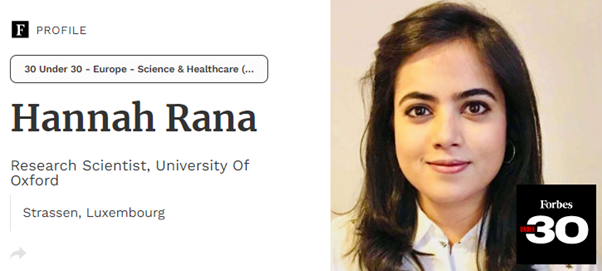Dr Hannah Rana has been named by Forbes on the 2022 Forbes 30 Under 30 Europe list in the Science and Healthcare category. This year, the lists received tens of thousands of nominations and were carefully reviewed by an international judging panel of experts. Hannah, a space cryogenics researcher, has been selected amongst the final 30 to be awarded in the Science and Healthcare category. The young scientist has also been awarded a prestigious Schmidt Science Fellowship.
The Forbes 30 Under 30 are annual lists that highlight the most exceptional pioneers across a range of categories, from science to arts to business, under the age of 30.
Hailing from Luxembourg, Hannah has always been passionate about science and making an impact in the space industry. She completed her PhD at the University of Oxford in space cryogenics and now works as a researcher at the NASA Jet Propulsion Laboratory, developing cryogenic instrumentation for the next generation of space detectors.
In her research, she builds on experience and knowledge gained during her time at Oxford, the European Space Agency, and CERN. Hannah previously attended the Lindau Nobel Laureate Meetings in Physics in 2019, which was sponsored by the FNR.
On being recognised by Forbes, Hannah says “It’s an absolute honour to be recognised amongst such talented and exceptional young individuals. It serves as motivation for me to keep pushing the boundaries in my research and to continue to encourage and support my peers in the scientific community.”

Being awarded a Schmidt Science Fellowship
In 2022, Hannah has also been awarded the Schmidt Science Fellowship, making her one of 29 new Fellows and part of a group of exceptional early-career scientists from around the world, each committed to transcending disciplines to advance discovery and driving innovation that improves the quality of life for all.
As a Schmidt Science Fellow, Hannah will pivot from thermodynamics and space instrumentation to biomedical engineering to advance the development of artificial retina with the aim of restoring vision to the blind.
“My research will be taking a short-term pivot out of space science and into artificial retina research for restoring vision to the blind. I will be doing this whilst on sabbatical year from NASA to see how space tech I work with can be transferred to this vital problem,” Hannah said.
Last updated 17 June 2022